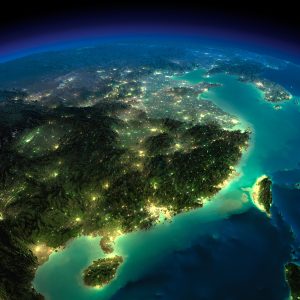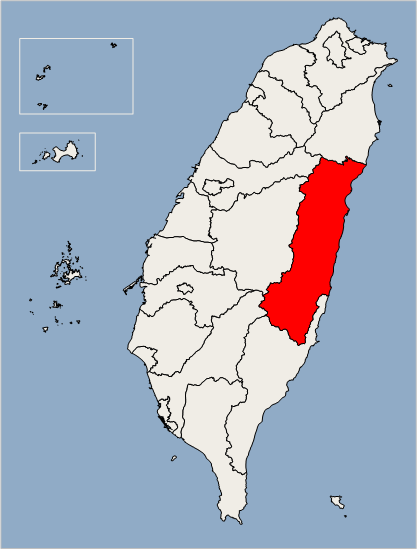On May 23, the Bluebird Movement drew over 100,000 participants to a rally outside Taiwan’s Legislative Yuan. The demonstrators were protesting against a series of disputed “parliamentary reform bills” proposed – and eventually passed – by the Kuomintang (KMT) and the Taiwan People’s Party (TPP).
The protesters specifically targeted two figures: Huang Kuo-chang, the TPP’s caucus whip and a former key figure in the Sunflower Movement who has since aligned with the KMT, and Fu Kun-chi, the KMT’s caucus whip. From the perspective of local policies shaping Taiwan’s dependency on China, Fu is the more important figure.
Fu, a major political player in Hualien County on Taiwan’s east coast, has been perceived as a significant proxy for the People’s Republic of China (PRC) in Taiwan. He served two terms as a Hualien County legislator, elected first as an independent, and then as a member of the KMT. Even after being expelled from the KMT, he successfully ran for Hualien County magistrate and held the position for eight consecutive years.
Although he was found guilty on charges of stock manipulation in 2008 and disqualified from holding civic office (a restriction eventually overturned by the Supreme Court), his influence in Hualien remained strong. During his imprisonment, which began in 2018 after a lengthy appeals process ran its course, he supported his wife, Hsu Chen-wei, in successfully running for county magistrate. She won re-election in 2022.
Together, Fu and Hsu have dominated Hualien’s political landscape for over 14 years, making them one of Taiwan’s most enduring political families of this century.
After his release from prison in 2019, Fu was reinstated in the KMT and re-elected as a legislator in 2020. He became a core figure within the party. This January, after the KMT regained its position as the largest party in the Legislative Yuan, Fu took on the role of KMT’s caucus whip.
In April 2024, he led 16 other KMT legislators on a trip to China to meet with Xi Jinping’s key advisors, including Wang Huning, the chairman of the Chinese People’s Political Consultative Conference (CPPCC). The trip stirred controversy not only due to the cross-strait implications, but because of its timing: Hualien experienced its most severe earthquake in 25 years this April, causing significant damage. By carrying on with the trip, Fu was accused of prioritizing ties with Beijing over the reconstruction and recovery efforts in Hualien.
Fu’s dominance in the central political landscape, coupled with his ties to Beijing, have raised questions about China’s influence on Taiwan’s eastern region.
Since 2000, the two counties in Taiwan’s east, Hualien and Taitung, have been loyal supporters of the KMT and the pan-Blue coalition. The local Indigenous population, which makes up about 30 percent of residents, has long been seen as an “iron vote” for the KMT and Pan-Blue politicians.
In the 16th presidential election in January, KMT candidate Hou Yu-ih gained only 33.5 percent of the national vote, but his vote share in Hualien exceeded 50 percent. Democratic Progressive Party (DPP) candidate (and current president) Lai Ching-te lost by over 25 percentage points in Hualien, the largest gap in vote share for Lai in any voting district on Taiwan proper (excluding the offshore islands)
The loss was all the more striking as Hsiao Bi-khim, Lai’s vice president, held the legislative seat from Hualien from 2016-2020. Hsiao was defeated by Fu in her bid for a second term as Hualien legislator in 2020, furthering the DPP’s decline in political influence in the eastern region.
In the current context, the KMT’s dominance in Hualien equates to Fu’s dominance. Not only do Fu and his wife serve as Hualien’s regional legislator and county magistrate, respectively, but the local politicians they support occupy various positions throughout the county, making Fu the “King of Hualien.”
Fu has historically secured support through advancing transportation infrastructure. During his tenure as county magistrate, he filled in a small creek in Hualien City, known as “Gouzaiwei,” to build a 770-meter long road. Instead of using locally sourced Hualien marble, he imported marble from China, with the total cost amounting to 450 million Taiwanese dollars (NT$).
During construction, Fu faced accusations of ignoring advice from urban planners and even seeking to benefit specific companies. After the project’s completion, residents along the road experienced issues such as water accumulation and uneven surfaces, bolstering concerns that it was a typical white elephant project.
This approach to construction has become Fu’s signature style during his campaigns. In 2020, with the slogan “Give Hualien people a safe road home,” he championed the Freeway No. 6 east extension plan. This was the election where Fu defeated the DPP’s Hsiao Bi-khim, winning his fourth term as legislator.
The east extension plan of Freeway No. 6 is a highly challenging project. With the backing of the KMT and the TPP, the plan was swiftly reviewed in the Legislative Yuan. Fu has proposed other two bills that would mandate the government to expand the high-speed rail system to the east coast and build an expressway connecting Hualien and Taitung counties. According to a government, the three projects will cost around NT$2 trillion (US$61.8 billion), equivalent to around 10 percent of Taiwan’s 2023 GDP and close to the central government’s entire 2024 general budget (which is just over NT$2.8 trillion).
Fu has called for the bills to be passed before the legislative session ends in mid-July, although other KMT legislators have pushed back, saying there is no need to rush.
In the three bills, Fu specifically called for international companies to participate through a Build-Operate-Transfer (BOT) model. This has raised concerns that it might serve as a backdoor for Chinese capital to enter local projects through reinvestment. Chinese infrastructure companies have often undertaken projects abroad under similar models.
There have been reports of the Fu family accumulating wealth by reselling land to Chinese investors. In 2011, in a ceremony attended by Hsu, the Rongliang Company invested in construction projects worth 47 billion yuan in Nanning, China; the next year, Rongliang inked a deal to invest another 47 billion yuan in Dongguan, China. Hsu has served as the chair of Rongliang, and in a 2017 tax evasion case prosecutors alleged that Fu was the real owner of the company.
In that case, Fu was accused of pressuring a prominent Hualien hotel, Promised Land Resort and Lagoon, to sell large parcels of land to Rongliang at below the market rate. Rongliang then resold the land to another developer, netting over NT$160 million overnight.
Fu denied the charges, calling them “political persecution.” He was acquitted in 2020.
Further complicating the Promised Land Resort case, Taiwanese media reported that Fu had attempted to resell the land to a Chinese state-owned enterprise, Beijing Enterprises Group Company Limited, using third-country investors as a cover. (It would have been illegal under Taiwanese law for a Chinese firm to buy the land outright.) The Fu family thus was accused not only of using its political influence to profit from land development, but attempting to bring Chinese capital into Taiwan.
In general, the development of both tourism and transportation infrastructure are attractive projects for the residents of the eastern Taiwan region, where industry and living conditions are underdeveloped. However, this has resulted in the infiltration of Chinese capital into the local economy.
Since Taiwan opened up to Chinese tourists and investments in 2008, Hualien has become one of the most popular destinations for Chinese visitors. Hong Kong-based travel agencies have established one-stop service chains in the area, monopolizing souvenir shops, hotels, tour bus services, and dining establishments frequented by Chinese tourists. Under this model, the spending of these Chinese tourists largely returned to the hands of Chinese owners without being taxed.
Worse, these one-stop services funded by foreign capital also generated a vicious price competition, severely damaging local businesses. The continually declining quality of tourism has also led to a downturn in domestic tourism in Hualien.
In August 2019, the Chinese government suspended the policy allowing Chinese tourists to travel freely to Taiwan. However, with the decline of domestic tourism in Taiwan due to the COVID-19 pandemic, the absence of Chinese tourists has resulted in a significant loss of money for local hotel and real estate businesses. In order to persuade Beijing to lift the suspension on free travel to Taiwan, Hualien’s local businesses have been persistently pressing the DPP government to adopt a softer stance toward China.
These demands have effectively become political capital for Fu in his negotiations with the PRC government. After visiting China in April, Fu mentioned the possibility of revising restrictive measures like the Anti-Infiltration Act and other factors unfavorable to cross-strait exchanges.
Fu’s vigorous push for the three transportation projects in Hualien and Taitung can be seen as paving the way for a prosperous development of cross-strait relations, benefiting his loyal supporters in Hualien – and potentially Chinese businesspeople. These challenging transportation projects would require large-scale engineering equipment, a strength of the Chinese state-owned engineering groups that have set numerous world records.
The rise in land values around the road projects presents a lucrative opportunity for the Fu family, well-known for their expertise in land brokerage. Moreover, land development opens opportunities for Chinese capital to be integrated into local businesses, establishing more one-stop services.
Finally, these government-funded projects would act as Fu’s goodwill gesture to Beijing, aiming to reopen Hualien to a large influx of Chinese tourists.
Hualien stands as a crucial gateway in eastern Taiwan, home to the largest military port in the east, Hualien Port, and the Jiashan Air Force Base. Just 140 kilometers from Japan’s Yonaguni Island, Hualien serves as a crucial base for Taiwan’s navy and air force, facilitating access to the Pacific Ocean and maintaining vital connections with the U.S. military base in Okinawa, Japan.
Allowing Chinese capital to monopolize Hualien’s economy will trigger a series of domino effects, undermining Taiwan’s efforts to cooperate militarily with allies like the United States and Japan. While Fu leverages his China connections to boost his political status within the KMT, he is set to continually sabotage Taiwan’s efforts to break free from Beijing’s influence.


































